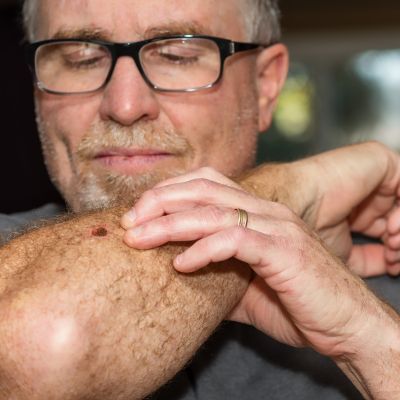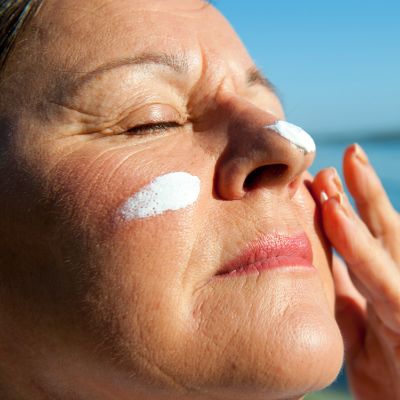The American Cancer Society expects 2,180 Hoosiers to develop melanoma, a type of skin cancer, in 2023. It’s considered by many to be the most dangerous form of skin cancer, making skin cancer prevention extremely important this summer. In this blog, we give you the tips you need to stay safe and protect your skin well beyond summer and into the school year.

UV radiation damages skin cell DNA, resulting in skin cancer. Preventative measures include sunscreen, protective clothing, and self-tanning products. Skin cancer comes in different forms like melanoma, basal cell carcinoma, and squamous cell carcinoma. Protection, early detection, and timely treatment are vital for reducing risks.
The Role of UV Radiation in Skin Cancer
The DNA in skin cells can be damaged by UV radiation, usually from the sun or tanning beds. This occurs on the genetic level, leading to disruptions in the form of mutations and uncontrolled cell growth, which are common symptoms of skin cancer. UV radiation specifically triggers the formation of structures in DNA that lead to abnormalities related to skin cancer.
Learn when cancer surgery is necessary.
Tips for Skin Cancer Prevention This Summer
The threat of skin cancer is very real. Fortunately, there are steps you can take to protect yourself and your family all summer long.
To reduce the risk of UV-related skin cancer:
- Use sunscreen
- Wear protective clothing
- Switch to self-tanning sprays and lotions
By following these steps, you’ll keep your skin safe from whether it’s UV rays from the sun or tanning bed. This will ensure that you reduce your risk of skin cancer, not only in the hotter months, but all year long.
Use Sunscreen
Sunscreen is vital during summer to safeguard skin from harmful UV radiation. Along with preventing sunburn and signs of premature aging, it also reduces your risk of skin cancer.
To get the most out of your sunscreen, make sure to:
- Use a broad-spectrum sunscreen with SPF 30 or higher
- Apply 15 minutes before going outside
- Cover all exposed areas (including lips and ears)
Effectiveness diminishes over time so be sure to reapply sunscreen regularly to ensure maximum protection. This includes reapplying every two hours. It’s also important to reapply sunscreen after swimming or sweating if it’s not waterproof.
Keep in mind that the sun isn’t only a danger on bright, sunny days. UV rays can penetrate and cause damage even on cloudy days so be sure to keep your sunscreen handy. Consistent and proper use will provide the maximum protection needed to keep skin healthy all summer and year long.
Wear Protective Clothing

Wearing protective clothing offers a crucial defense against skin cancer. They create a physical barrier, shielding the skin from the harmful effects of the sun’s rays.
This includes garments such as:
- Long-sleeved shirts
- Wide-brimmed hats
- Sunglasses with UV protection
UV rays from the sun are a leading cause of skin cancer. This is because they can damage the DNA in skin cells and trigger mutations that lead to malignancies. By covering exposed skin areas, these clothing items reduce direct UV exposure and decrease the risk of skin cancer. They act as an additional layer of sun protection alongside sunscreen. Together, they help maintain skin health and prevent potential consequences of overexposure to UV radiation.
Switch to Self-Tanning Sprays and Lotions
Choose self-tanning sprays and lotions over UV exposure from the sun or tanning beds. These products contain dihydroxyacetone (DHA), a safe color additive that interacts with the outer skin layer to create a tan-like appearance without UV damage. Making the switch will reduce your risk of skin cancer by preventing the need for prolonged and intense UV radiation.
UV radiation from the sun or tanning beds damages skin cells and increases the risk of skin cancer. Self-tanners provide a safer alternative, allowing you to achieve a bronzed look without subjecting your skin to harmful rays. By avoiding UV exposure, you significantly decrease the likelihood of skin cancer development while still enjoying a sun-kissed glow.
Learn what types of oncological surgery we offer in Evansville, IN.
Understanding Skin Cancer
Skin cancer comes in various types. This includes:
- Melanoma
- Basal cell carcinoma
- Squamous cell carcinoma
Melanoma is considered by many to be the most serious type of skin cancer because of how quickly it spreads. Squamous cell carcinoma is the second most common form of skin cancer and is easily treated in most cases. Basal cell carcinoma grows much more slowly, is highly treatable, and isn’t life-threatening if not treated immediately.
Risk factors for skin cancer can vary widely. They include:
- UV exposure
- Fair skin
- Family history
- Weakened immunity
Early detection and treatment are crucial as they enhance survival rates and limit complications. This underscores the significance of regular skin examinations and swift medical intervention.
Summer Doesn’t End When School Starts
It may seem natural to put up your sunscreen once school starts. After all, the summer is over as soon as kids go back to school, right?
Not so fast.
UV rays from the sun are a year-round threat, especially if they play sports or just enjoy being outside. Preventing skin cancer is a year-round responsibility. Fortunately, all the tips from this blog can be implemented no matter what season it is.
Do you want to learn your treatment options for skin cancer and other cancers? Call us today at (812) 424-8231 or (800) 264-8231 to schedule your appointment!
UV radiation harms DNA in skin cells, leading to skin cancer. Take proactive steps such as using sunscreen, wearing protective clothing, and avoiding tanning beds. Various types of skin cancer exist, including melanoma, basal cell carcinoma, and squamous cell carcinoma. Protecting yourself, early identification, and prompt treatment are crucial for risk reduction.
Evansville Surgical Associates has been providing comprehensive and compassionate surgical care for over 50 years. Call us at (812) 424-8231 or (800) 264-8231. We are available from 8:00 a.m. to 4:30 p.m. if you would like to schedule an appointment.



